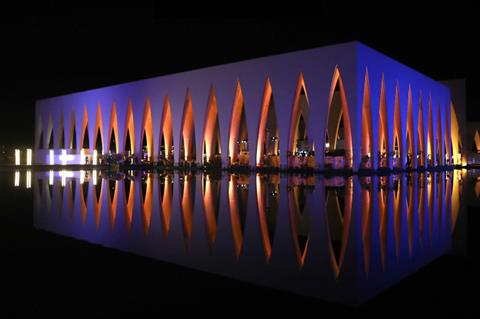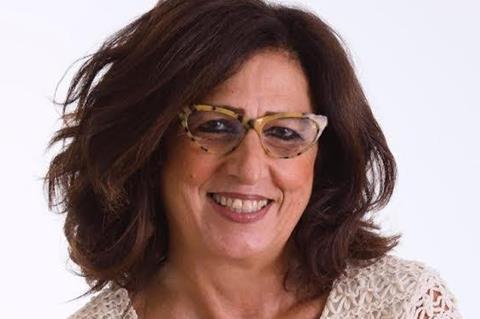
After a challenging few years, El Gouna Film Festival is returning with renewed energy and a fresh vision to champion emerging filmmakers and diversify its audience.
The seventh edition of El Gouna is set to take place from October 24 to November 1 in the Egyptian resort town on the shores of the Red Sea, screening more than 80 features and shorts from over 30 countries. It follows a decision to cancel the event in 2022 to examine the “artistic and organisational side of the festival” and postpone last year’s edition due to the ongoing Israel-Gaza conflict.
Marianne Khoury came on board as artistic director just months before last year’s subdued sixth edition, which dialled back the festival’s usual glamour to focus primarily on screening films.
“These circumstances helped me achieve what I’m setting out to do,” says Khoury, who aims to bring more attention to the programme, with an emphasis on Arab cinema, as opposed to the glitz of the red carpet. “I was chosen for this role to make a change.”
Reshaping one of the leading festivals in the Middle East and North Africa is no small task but Khoury’s experience is extensive. With more than three decades of experience as a director and producer, she is a managing partner at Cairo-based Misr International Films, which was founded by her uncle, renowned Egyptian director Youssef Chahine. Khoury also established Zawya Cinema, Egypt’s signature art house, and the Panorama of the European, an annual event that showcases award-winning films in Cairo.
“For me, a festival is a film-centric cinematic environment,” she says. “El Gouna has always had a solid programme, but it needs to reach a more diverse audience.”
Award-winning international features include Coralie Fargeat’s The Substance, which won best screenplay when it played in Competition at Cannes; Mohammad Rasoulof’s The Seed Of The Sacred Fig, which picked up two awards including the special jury prize at Cannes; and Pedro Almodovar’s The Room Next Door, winner of the Golden Lion at Venice.
The 15-strong feature narrative competition, vying for the Golden Star, include Arab titles such as Meryam Joobeur’s Who Do I Belong To, which played in competition at the Berlinale, and Nabil Ayouch’s Everybody Loves Touda, which premiered at Cannes.
Arab highlights among the 12 titles in the feature documentary competition include Nada Riyadh and Ayman El Amir’s’s The Brink Of Dreams, which won the Golden Eye Award for best documentary at Cannes’ Critics’ Week; and Rand Beiruty’s Tell Them About Us, which premiered at CPH:DOX.

“We are always on the lookout for unique discoveries,” says Khoury. “I prefer to look for unusual films representing cinema of the Global South.”
Nearly 50% of the line-up is directed by women – including Saule Bliuvaite’s Toxic, winner of Locarno’s Golden Leopard, and Palestinian filmmaker Laila Abbas’s Thank You For Banking With Us! – while 12 out of the 55 features in the selection are either first or second films.
Honoured this year with career achievement awards will be Mahmoud Hemida, an Egyptian producer and filmmaker who leads production company Al-Batrik; and Lebanese filmmakers Joana Hadjithomas and Khalil Joreige.
Emerging talent support
As well as recognising these established figures, the festival will showcase rising talent with the likes of CineGouna Emerge, a dedicated section for young talent. Now in its second year, the programme has invited 200 film students and emerging filmmakers from various Egyptian cities to experience the festival for seven days, where they will watch films and participate in workshops and masterclasses.
Further elements to support regional talent and promote creativity within the local industry include CineGouna Funding (formerly CineGouna SpringBoard), backing Arab projects in development and post-production; as well as CineGouna Forum (previously CineGouna Bridge), which will continue to provide professional development opportunities through industry discussions, masterclasses, and workshops.
Also on the industry front, a second edition of the CineGouna Market will host 22 exhibitors and a new programme that encourages networking and meetings with industry experts, tailored to each company’s specific needs.
In addition, new section CineGouna Shorts will include a funding competition for short films, further reinforcing the festival’s commitment to nurturing creative talent.
It provides El Gouna with a solid offering in the competitive MENA film festival space, which includes Marrakech, Cairo and the most-recent entrant, Red Sea International Film Festival.
However, Khoury views this competition from a different perspective. “Nowadays, filmmakers need to have more than one platform to support their work,” she adds. “It’s about the exposure that a festival can provide to the filmmaker.”







![The Brightest SunScreen[Courtesy HKIFF]](https://d1nslcd7m2225b.cloudfront.net/Pictures/274x183/3/5/0/1448350_thebrightestsunscreencourtesyhkiff_312678.jpg)

















No comments yet